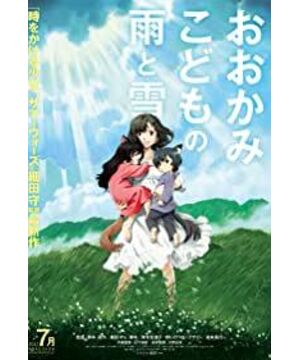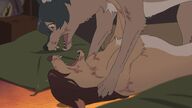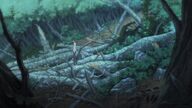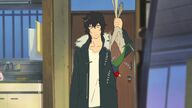As of today (2012.9.18), the box office has exceeded 4 billion yen, far surpassing the 1.9 billion in "Summer Fight". Hosoda Mamoru himself was also excited to express his surprise. This highly anticipated Hosoda Mori’s new work is indeed worthy of its name. It is a rare masterpiece that makes me feel very moved and worthy of repeated memorabilia. It was only after watching the movie twice that I felt satisfied. This is a delicate and slightly bitter work, and it is destined that the audience cannot be treated with the relaxed and excited mentality of "Summer Battle", but to appreciate the true meaning of it quietly. In less than two hours, it tells the story of the 13 years from when the mother spent meeting and falling in love with the werewolf father to their children Xue and Rain finding their own world. I can’t help but think of a highly rated movie "The Eighth Day of Cicada" last year. It is also a story about a single mother who evaded social investigation and rushed to find a peaceful place where she can live with her child. It is heartwarming and moving. . And this work is not only about the story of a struggling mother, Hosoda Mamoru wants to highlight the growth experience of the mother and child. I saw the whole film with mixed feelings. What I feel is not only about the maternal love, but also about the vicissitudes of the years, about the perseverance of women, about the suffering of life, about the joy and pain of growing up, about the warmth and bondage of the family, about the uneasiness and anxiety about the future The choice, of course, also has Hua's optimistic attitude towards life. The feature film was over, the staff subtitles appeared, and the ending song was very quiet and warm, but I still couldn't calm down for a long time. I waited until the ending song was over before I slowly got up and left the theater. In the few days after watching the movie, I listened to the original sound again and again, moved and melted again and again by the clear and warm music. From time to time, the beautiful life of the family appeared in my mind, and tears flowed out. . The key words of the two Hosoda Mamoru, the soft strings and piano of the spring afternoon sun, the whispering whispers, the singing in a low voice... Accompanied by wonderful music, this fresh and warm story began on campus. Yes, fresh. This is the key word of Hosoda Mamoru. Whether it's the green and freshness of "A Girl Beyond Time and Space" or the cheerful and freshness of "Summer Fight", the freshness always runs through his works. As long as you see the familiar Hosoda Mamoru-style pictures and Sadamoto Yoshiyuki's characters, you will feel refreshed. This work is warm and refreshing, and healing and refreshing. Life, this is another key word in Hosoda Mamoru's work. Hosoda Mamoru is very good at portraying picture-scroll-style fragments of life. "A Girl Beyond Time and Space" tells the most youthful experience of life-the feelings and bits and pieces of high school life, while "Summer Battle" depicts a picture of family life. I thought that a movie with a "werewolf" related theme should have more magical colors, maybe it would lose the style of the previous work and create a sense of contradiction, right? In fact, this is unnecessary worry. Apart from the surreal setting of "Werewolf," the work has no fantasy elements. It can even be said to be a surprising reality, a real life. Compared with the previous work, although this work has different themes, different profound meanings, and different touches, it is still a work with the label of Hosoda Mamoru. It is still Hosoda Mamoru’s favorite and best performance-those with With a little sci-fi story about life fragments. Fresh, everyday, literary... No matter what vocabulary you use to describe Hosoda Mamoru’s works, it doesn’t matter, because the magic of Hosoda Mamoru lies in the excitement, love, emotion, and emotion after watching the movie. You can always more or less connect your experience with the movie. I felt it resonated, and my own experience and life became clear, shimmering. A major feature of the movie Hosoda Mamoru is the vivid portrayal of the characters and the meticulous handling of the characters' movements, so I also want to start with the characters. Although the name of the film is "The Wolf's Child Snow and Rain", I believe it is not the two little wolf boys, Snow and Rain, that remain the most memorable in the hearts of the audience, but the determined and optimistic mother flower. Speaking of a determined female image, that is Hayao Ghibli’s favorite; however, Mamoru Hosoda has created a female image no less than Hayao Miyazaki. If the women described by Hayao Miyazaki are more heroic, extraordinary, and daring to fight against fate, then the women described by Hosoda Mamoru are more realistic and more flesh-and-blood. They have the shortcomings that ordinary people have, and they don't have the power to fight against fate, but they all have lovable things. Although they are manipulated by fate, they will still live optimistically. Hua is such an optimistic girl. Even if her father died prematurely, her lover died unexpectedly, she had to raise two babies by herself and avoid the misfortune of the world, she still lives optimistically and strongly. Sister Xue, is a very likable character. Most of the film seems to be accompanied by Xue's cheerful voice. Since childhood, the lively and cheerful Xue Xue not only likes to laugh loudly and loudly, but also jump up and down and be very naughty, causing a lot of trouble for her mother Hua, and Hua seems to have no way to get the snow. The cuteness of the little wolf boy is also manifested from Xue's anger and coquetry: from time to time he becomes a little wolf and yells, runs like a puppy in the house, and suddenly becomes a girl when he is happy. It must be seen by the audience. This scene will be cute. Xue Xue has been like a little wolf since she was a child. She is lively like nature, likes to scare and chase animals, and is good at hunting small animals. Unlike her younger brother, Yu, who is almost non-wild, she is as timid and fearful and needs protection like a domestic puppy. Perhaps it is precisely because of Xue’s optimism and cheerfulness that she wants to interact with people and integrate into the human society. She persuaded Hua to send her to elementary school. She became acquainted with the girls in the class. She gradually discovered that ordinary girls do not dare to play snakes like she does. He likes to collect small animal bones, so he changes himself to be more like a girl. However, the werewolf is a werewolf after all, and he would still have to hurt others, especially the ones he likes, so, unexpectedly, in the end Xue turned out to be fighting against his wolfish side, hoping to become a real human. Brother Yu, is a character I like very much. Yusheng Sex is weak, needs mom to pat, don't like unfamiliar environment, afraid of bugs, can't beat kittens, don't like to go to school, don't like to socialize with people. However, Yu is kind and sensitive, loves nature, and likes to feel the world with his heart. The rain in my childhood can't help but remind me of myself before, so much like it. It is precisely because of rain’s alienation from human society and sensitivity to nature. When the rain grows up, this child who is least wolfish at a young age has merged into nature and the life circle of animals and learns the laws of nature from an elderly fox. , Become a real wolf. Growth, with joy and pain. This is a story about growth, and growth runs through the film. Hua grew up in the process of raising children, Rain and Snow grew up under the care of their mothers and chose their own path. Growth is always exciting. How exciting it is when Xue can be naughty around and gnaw at the table and grind his teeth! When the snow can skillfully catch mice, snakes, and pheasants, how exciting it is! How exciting it is when the height markings of snow and rain on the pillars change year by year! How exciting it was when the three of Xuehou, mother and son ran happily across the pure white wilderness! However, on the way back from the game, the rain fell into the water to catch a big bird and almost died. Fortunately, the snow rescued him in time. Hua was heartbroken, and Xue stayed aside. Growing up is also accompanied by worries and troubles, as well as memories of suffering. And the scene in which rain and snow fought because they were wolves or humans was the most destructive aspect of growth. The two brothers and sisters really grabbed each other, and rolled from one room to another, stirring up the house. Growing up will make people better understand who they are, but understanding and tolerance of others may not follow, so contradictions, conflicts, and instability are all about to move around from time to time. At the end of the film, Hosoda Mamoru uses a lot of space to tell a story that happened on a rare rainy day. The younger brother's name, Yu, seems to imply that such a rainy day will become an important turning point in the life of the family. In the heavy rain, the mother, elder sister, and younger brother each searched for the meaning of life painfully and arduously. Finally, after the rain passed and the weather cleared, they each gained growth and started a new life. Xue has gained the love and trust that is important as a human being. Yu finally chose the path of the wolf. After Hua chasing Yu Weiguo, he finally understands that the children have grown up, and it is time to trust them and let them go. At this time, Hua's smile was particularly dazzling, shining with the joy of regaining a new life. I have to say that although the last part of the flower shows the child's maternal love vividly, the story itself is a bit boring, especially when compared with the fast-paced narrative in the first half of the film, it looks depressing and lengthy. At that time, I felt hard to say Hosoda I stayed sluggish, but I did feel that the later period that was supposed to be a climax did not have much ups and downs and sublimation. It was just a repeated depiction of the mother's concern for the child who was taking steps. In the end, the mother recognized the child's growth. However, after the main film is over and the staff subtitles appear, watching the scenes from the beginning to the end of the film, listening to the quiet ending song, the taste of the last story is only a little tasted. And the next day I found the OST from the Internet to enjoy it. I just listened to the album over and over again for several days, savoring the gentle and peaceful songs, and I felt even more touched, as if my heart melted and I wanted to watch it again. The impulse of the movie becomes stronger and stronger. I realized that the whole movie, especially the last story, was like an olive. The moment I ate it, it didn’t feel very delicious or even bitter. However, as the taste adapts, the more you chew, the more you feel. smell. In fact, isn't life the same? There is often no lack of ordinary and painful experiences in life, but with the passage of time, you can gradually taste the meaning and value of those experiences. Finally, under the brilliant starry sky, the werewolf father’s hair fluttered in the wind with the rustling leaves. The scene where his handsome face turned into a wolf little by little, little by little, and the warm and fresh soundtrack were deeply in my mind. , The delay cannot fade away.
View more about Wolf Children reviews











